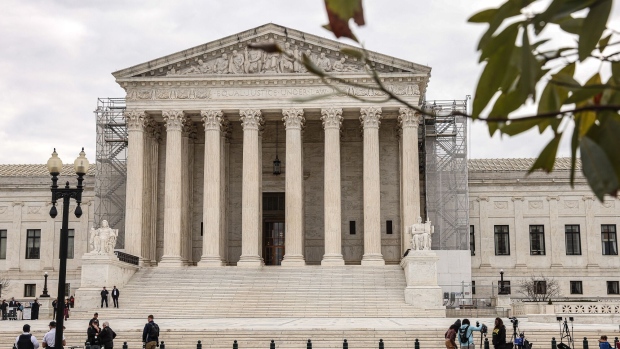(Bloomberg) — The US Supreme Court signaled it’s likely to reject curbs on the Biden administration’s contacts with social media companies, hearing a case that will shape efforts to tackle election interference and misinformation during the final months of the 2024 campaign.
Key justices on Monday questioned lower-court rulings that imposed restrictions on the White House and several federal agencies after concluding they had unconstitutionally coerced social media platforms into taking down posts about the pandemic and the 2020 election.
Justice Brett Kavanaugh suggested he didn’t see anything unusual in the government’s interaction with the platforms. “In my experience, the United States in all its manifestations has regular communications with the media to talk about things they don’t like, or don’t want to see, or complaining about factual inaccuracies,” said Kavanaugh, a former Justice Department and White House official.
At issue is how much power the government has to tackle online falsehoods without running afoul of the Constitution’s free speech clause. A ruling for the Biden administration would give it a freer hand to try to influence content moderation decisions by social media companies including Meta Platforms Inc. and Alphabet Inc.’s Google. The court is scheduled to rule by late June.
Several justices voiced skepticism about the sweeping legal arguments being pressed by the Republican attorneys general in Louisiana and Missouri in their suit against the administration.
Justice Amy Coney Barrett seemed taken aback when Louisiana Solicitor General Benjamin Aguinaga said the FBI couldn’t encourage social media companies to take down threatening posts about members of that state’s government after they were “doxxed.”
“Do you know how often the FBI makes those kinds of calls?” said Barrett, whose Virginia home has been the target of protests in the two years since she voted to overturn the constitutional right to abortion.
‘Censorship Enterprise’
Missouri, Louisiana and five of their residents sued over what they called a “sprawling federal Censorship Enterprise” involving dozens of officials and at least 11 federal agencies. A federal trial judge agreed and issued a sweeping injunction restricting contacts by hundreds of thousands of government workers.
The 5th US Circuit Court of Appeals narrowed the injunction but left it intact against the White House, the FBI, the Centers for Disease Control and Prevention, and the Cybersecurity and Infrastructure Security Agency.
The Supreme Court put the 5th Circuit ruling on hold in October over the dissents of conservative Justices Clarence Thomas, Samuel Alito and Neil Gorsuch. All three questioned the Biden administration’s arguments on Monday, with Alito voicing strong disapproval of the federal government’s social media outreach, which at times included curse words and demands for immediate answers.
“It’s treating Facebook and these other platforms like they’re subordinates,” Alito told Deputy Solicitor General Brian Fletcher, who was representing the administration. “Would you do that to the New York Times or the Wall Street Journal or the Associated Press, or any other big newspaper or wire service?”
Although the October order lifted the restrictions, the administration is being cautious for now and isn’t in touch with social media platforms about election-related matters, according to an official who works on those issues.
‘Such a Problem’
Monday’s session suggested the other six justices are likely to side with the federal government. Chief Justice John Roberts questioned whether the actions of a single federal agency could definitively constitute illegally coercion, saying the government “is not monolithic.”
“How do you analyze a situation where maybe the EPA is trying to coerce the platform about something and the Army Corps of Engineers is trying to coerce them the other way?” Roberts asked. “I mean, you can’t just sort of pick and choose which part of the government you’re concerned about.”
Justice Sonia Sotomayor at one point told Aguinaga she had “such a problem with your brief,” accusing him of omitting information and misstating an important fact.
The clash is one of two cases over governmental pressure – known colloquially as “jawboning” – before the high court Monday. The justices are also considering National Rifle Association claims that a New York state official unconstitutionally pressured insurance companies including Chubb Ltd. and Lloyd’s of London to stop doing business with the gun lobby.
The case is Murthy v. Missouri, 23-411.
–With assistance from Emily Birnbaum.
(Updates with comments from Barrett, other justices starting in sixth paragraph.)
©2024 Bloomberg L.P.

